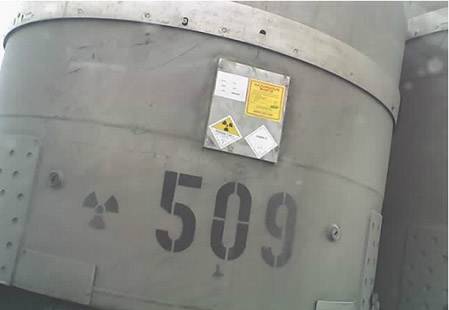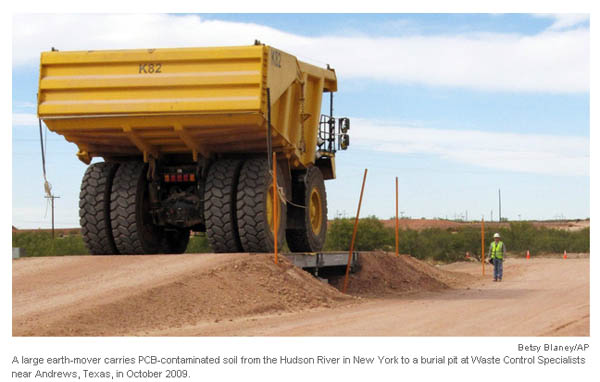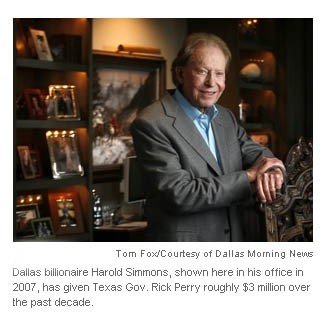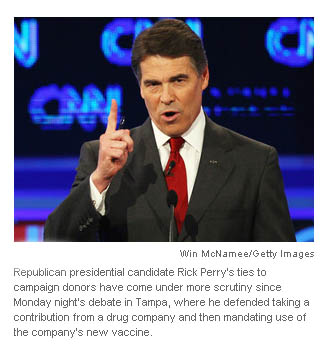Archive for the ‘Toxic Waste Dump’ Category
Texas officials approve radioactive waste dump
Friday, March 23, 2012
By Jim Vertuno, The Associated Press
Austin American Statesman
AUSTIN, TEXAS — Radioactive waste from dozens of states could soon be buried in a Texas dump near the New Mexico border after Texas officials gave final approval Friday to rules allowing the shipments.
Texas lawmakers in 2011 approved the rural Andrews County site to take the waste and the Friday’s unanimous vote by the Texas Low-Level Radioactive Compact Commission cleared a major hurdle to allow the waste burial.
Texas already had a compact legal with Vermont to take its waste. Environmentalists have argued against expanding the program to 36 more states, warning it could result in radioactive material rumbling through the state on trucks with few safeguards in case of an accident. They also say a problem at the waste dump could lead to potential underground water contamination.
Dallas-based Waste Control Specialists, which owns and operates the site, insists it will be safe. The waste would be entombed in concrete about 100 feet underground in an area with densely packed clay. The site still needs final approval from state environmental regulators, and company president Rod Baltzer said it could happen as early as next week.
Applications to bury waste at the Andrews site must be approved by the compact commission on a case-by-case basis. At least three have already been filed, Baltzer said. If they are approved, material could start arriving in May.
Waste Control Specialists officials say accidents are infrequent when low-level radioactive waste is moved. Data from the U.S. Department of Transportation’s Pipeline and Hazardous Materials Safety Administration show that, from 2003 through 2011, there were 72 incidents involving trucks with radioactive material traveling on highways. One person died and the accidents caused $2.4 million in damages.
That compares with almost 64,000 incidents involving flammable/combustible liquids — the leader in hazardous materials accidents in the nine-year span. Seventy-six people have died in those incidents, which caused $319.5 million in damages.
Texas officials say there is no requirement to notify law enforcement of which routes trucks carrying low-level waste will take.
Karen Hadden of the Texas SEED Coalition, an environmental group, warned the commission that many rural counties don’t even have professional fire departments to respond in case of an accident.
"The magnitude of risk here is huge," Hadden said.
Hadden also said the commission should require independent audits of the shipments to make sure only low-level material is coming in. The Texas Commission on Environmental Quality has an on-site inspector to monitor shipments and Baltzer said the facility won’t take materials it’s not licensed for.
"I’m not sure you can ever do enough to satisfy some people with the number of audits in place," Batlzer said.
Waste Control, which stores, processes and manages hazardous wastes at the site, has spent hundreds of millions of dollars to open the dump. In 2009, the state issued two licenses to the company to bury low-level radioactive waste, making it the nation’s only dump for all classes — A, B and C — of nuclear debris and the first low-level site to open in 30 years.
One license pertains to the compact between Texas and Vermont that allows for disposal of radioactive materials such as uranium, plutonium and thorium from commercial power plants, academic institutions and medical schools. In 2011, lawmakers approved expanding that to 36 other states.
The other license deals with similar materials from sites run by the U.S. Department of Energy, such as Los Alamos National Laboratory in New Mexico, Hanford Site in Washington state and other federal facilities.
Waste Control Specialists’ majority owner is Dallas billionaire and heavyweight GOP political donor Harold Simmons, who has given millions of dollars to Republicans, including Texas Gov. Rick Perry.
___
This document contains copyrighted material whose use has not been specifically authorized by the copyright owner. SEED Coalition is making this article available in our efforts to advance understanding of ecological sustainability, human rights, economic democracy and social justice issues. We believe that this constitutes a "fair use" of the copyrighted material as provided for in section 107 of the US Copyright Law. If you wish to use this copyrighted material for purposes of your own that go beyond "fair use", you must obtain permission from the copyright owner.
Radioactive Waste Coming to Texas for Storage
March 23, 2012
Mose Buchele
KUT Austin

Low-level radioactive waste will be on trucks crossing Texas before long.
Photo courtesy mark gallagher at flickr.com/markgallagher/
State officials have given final approval to a plan allowing radioactive waste from across the country to be brought to Texas for storage. For StateImpact Texas, KUT’s Mose Buchele reports that the waste has people watching its transportation and storage closely.
We also want to make sure that it’s packaged properly, and that somebody is looking at all of those aspects.
Listen to the news story at KUT.
This document contains copyrighted material whose use has not been specifically authorized by the copyright owner. SEED Coalition is making this article available in our efforts to advance understanding of ecological sustainability, human rights, economic democracy and social justice issues. We believe that this constitutes a "fair use" of the copyrighted material as provided for in section 107 of the US Copyright Law. If you wish to use this copyrighted material for purposes of your own that go beyond "fair use", you must obtain permission from the copyright owner.
Texas company could bury 1st nuke waste in April
Monday, Mar. 19, 2012
By BETSY BLANEY
Associated Press/Fort Worth Star-Telegram
LUBBOCK, Texas — Trucks carrying low-level radioactive waste from 38 states will likely be rolling along Texas highways as early as April, bound for permanent burial at a dump near the New Mexico border.
The arrival of the low-level radioactive waste will end a years-long effort by a Dallas-based company, whose majority owner is big-time political contributor Harold Simmons, to win permission from Texas officials to accept the waste at 1,340-acre tract of scrub brush terrain about 360 miles west of Dallas. Opponents say Waste Control Specialists has benefited from Simmons’ connections to top Republicans, including Gov. Rick Perry.
The state’s commission overseeing disposal of low-level waste in Texas is expected to approve the final rule changes needed on Friday. State lawmakers cleared the way with a new law passed in the last legislative session. State regulators still need to sign off on the burial site’s construction.
Environmental groups have for years voiced concerns about the geology of the site and about the potential for contamination of underground water sources they say are too close. A "nightmare scenario" exists, though, in transporting the waste to the site, said Karen Hadden, director of the Texas SEED Coalition.
"All of it is dangerous but we are very concerned about highway accidents," she said. "There could be accidents in downtown Dallas or downtown Fort Worth and Houston. There is risk of radioactive contamination and exposure."
Company spokesman Chuck McDonald, who noted extensive testing at the site has shown it’s safe, said accidents involving transportation of radioactive material are infrequent.
"It’s actually a very good the track record," he said.
Data from the U.S. Department of Transportation’s Pipeline and Hazardous Materials Safety Administration show that from 2003 through 2011 there were 72 incidents involving trucks with radioactive material traveling on highways. One person died and the accidents caused $2.4 million in damages.
That compares with almost 64,000 incidents involving flammable/combustible liquids – the leader in hazardous materials accidents in the nine-year span. Seventy-six people have died in those incidents, which caused $319.5 million in damages.
There is no requirement to notify law enforcement officials along routes trucks will travel with the low-level waste, said Chris Van Deusen, spokesman for the Texas Department of State Health Services, which oversees the transportation of the waste.
One state legislator said he wonders whether those living along the routes are ready, were an incident to occur.
"Transportation of this waste is not route-restricted, and we don’t know whether local emergency response teams are prepared for such a scenario," said Texas Rep. Lon Burnam, a Democrat from Fort Worth.
Waste Control, which also stores, processes and manages hazardous wastes at the site, has spent hundreds of millions of dollars to open the dump. In 2009, the state issued two licenses to the company to bury low-level radioactive waste, making it the nation’s only dump for all classes – A, B and C – of nuclear debris and the first low-level site to open in 30 years.
One license pertains to a compact between Texas and Vermont that allows for disposal of radioactive materials such as uranium, plutonium and thorium from commercial power plants, academic institutions and medical schools. Last year, though, lawmakers approved allowing low-level radioactive waste from 36 other states to be buried in West Texas.
Petitions to bury waste from the compact states and the three dozen other states must be approved by the Texas Low-Level Radioactive Disposal Compact Commission, whose meeting is Friday, on a case-by-case basis.
The other license deals with similar materials from sites run by the U.S. Department of Energy, such as Los Alamos National Laboratory in New Mexico, Hanford Site in Washington state and other federal facilities.
Simmons, who is the world’s 100th wealthiest man with $9 billion on this year’s Forbes list, has given Perry’s campaigns $1.1 million during his time as governor. The governor is responsible for appointing environmental commissioners.
"That’s been the pattern all along," Hadden said. "When you’ve a billionaire at the helm of Waste Control Specialists and many lobbyists on the payroll, things tend to go your way."
She pointed to last fall when Waste Control was allowed to use stock from a publicly-traded sister company, Titanium Metals, to fund a trust to cover potential liability at the radioactive waste facility. The license required the company to provide $140 million in financial assurance.
State law allows several methods for the assurance, including a fully funded or a standby trust, a surety bond or an insurance policy but it also allows the agency’s executive director to approve other mechanisms on a case-by-case basis.
Once the waste is in the ground it becomes the property of the state. The disposal license is good until 2024 and can be extended by 10-year periods after that.
In an email response, an environmental commission spokesman said Waste Control told his agency that the cost to get a letter of credit in 2010 was prohibitive and that’s why they used stock as collateral instead. The company blamed changes in the market and the inability to get commercial insurance.
Environmental commission spokesman Terry Clawson’s email said using publicly-traded stock "has been done before for hazardous waste facilities." The agency required additional protections in allowing the company to use stock from the sister company, including a $20 million surety bond along with a standby trust agreement. After five years the company must come up with cash or a more secure, traditional form of financial assurance.
The federal government in the early 1980s began urging states to build low-level nuclear waste landfills, either on their own or in cooperation with other states by forming compacts. Since then, South Carolina entered into a compact with New Jersey and Connecticut, agreeing to dispose of nuclear waste at a landfill that later accepted waste from dozens of other states.
But about 10 years ago, South Carolina lawmakers said they no longer wanted to be the nation’s dumping grounds and in 2008 the facility began accepting waste from only its compact partners, leading other states to look to Texas to store their waste.
—
Online:
Texas Low-Level Radioactive Waste Disposal Compact Commission: http://www.tllrwdcc.org
Texas Commission on Environmental Quality: www.tceq.state.tx.us
Waste Control Specialists: http://www.wcstexas.com
Associated Press writer Betsy Blaney can be followed on Twitter at https://twitter.com/betsyblaney
This document contains copyrighted material whose use has not been specifically authorized by the copyright owner. SEED Coalition is making this article available in our efforts to advance understanding of ecological sustainability, human rights, economic democracy and social justice issues. We believe that this constitutes a "fair use" of the copyrighted material as provided for in section 107 of the US Copyright Law. If you wish to use this copyrighted material for purposes of your own that go beyond "fair use", you must obtain permission from the copyright owner.
Top Republican Donor Runs Into PAC Trouble
February 24, 2012
By Nicholas Confessore
The Caucus Blog New York Times
A Texas political action committee controlled by the nation’s pre-eminent Republican donor asked more than a dozen state lawmakers to return campaign contributions they received from the PAC last year, acknowledging that the contributions had violated state law.
The PAC, known as WCS-Texas Solutions, gave $65,000 to 18 Republican and Democratic candidates in 2011. But all of that money came from a single donor: Harold C. Simmons, a wealthy Texas businessman who is one of the top donors to Gov. Rick Perry and has emerged as the top donor to Republican "super PACs" in the presidential race this year.
Texas law requires that a state PAC have at least 10 donors, a provision designed to ensure that such committees are not used as shell organizations for donors wishing to hide their identities. Texans for Public Justice, a watchdog organization, filed a complaint on Thursday with the Texas Ethics Commission alleging that the contributions by WCS-Texas Solutions PAC violated that rule. Waste Control Specialists is a Simmons-owned company that stores radioactive and other hazardous waste.
The PAC quickly acknowledged the violation and said it would ask the lawmakers to return the donations while it brought itself into compliance with the law.
"The PAC did commit a violation by exceeding the contribution amount allowable prior to securing 10 contributing members," said William J. Lindquist, the group’s treasurer and a senior executive at one of Mr. Simmons’s other companies, Valhi Inc. "As the treasurer of the PAC, that oversight was my responsibility. We are working with the Ethics Commission now to get into full compliance."
The decision was reported on Friday by The Texas Tribune and The Dallas Morning News.
Craig McDonald, the director of Texans for Public Justice, said in a statement, “quot;We can only pray Simmons is exercising more caution in handling his nuclear waste than he is handling campaign contributions."
Perry Donor’s Radioactive Waste Site Deal Scrutinized
September 15, 2011
by PETER OVERBY
All Things Considered
NPR
| Listen to the Story | |
| All Things Considered [4 min 58 sec] | |

Presidential candidate Rick Perry’s ties to campaign donors came under more scrutiny this week when he was challenged during Monday’s Tea Party debate.
Perry defended taking a contribution from a drug company and then mandating use of the company’s new vaccine. “I raised about $30 million, and if you’re saying I can be bought for $5,000, I’m offended,” he said.
Actually, the drug company, Merck, has given Perry $28,500 overall. But that’s still pocket change compared with what Perry’s truly big donors have given.
In his career as governor of Texas, a state where millionaires are plentiful and contribution limits are lax, Perry has raised about half his campaign cash from just 204 big donors, according to an analysis by the watchdog group Texans for Public Justice. And his administration has helped many of those donors, even when it comes to disposing of radioactive waste.

‘The Wheels Have Been Greased’
Perry donor Harold Simmons, an 80-year-old billionaire, is a political player. He gave millions of dollars to Swift Boat Veterans for Truth in 2004, financing ads that knee-capped Democratic presidential nominee John Kerry.
For Perry, Simmons has anted up roughly $3 million worth of support over the past decade — some of the money going to Perry’s campaign committee, other dollars going to the Republican Governors Association when Perry was fundraising for it.
Simmons also owns Waste Control Specialists LLC, working in the heavily regulated industry of radioactive waste disposal.
Craig McDonald, of Texans for Public Justice, says those two facts go together.
“There has been no secret that Harold Simmons’ direct self-interest lies in building, permitting and operating his hazardous waste dump and low-level nuclear waste dump in West Texas,” he says. “And the wheels have been greased at every turn.”
An Environmental Review
In 2003, the Texas Legislature took the state-run radioactive waste program and made it a private monopoly for Waste Control Specialists. Simmons later bragged about the lobbying that accomplished that.
Waste Control Specialists owned the site in West Texas. But it needed an environmental review. A panel of eight state employees fended off corporate lobbyists and the Perry administration for four years to produce their report.
“We knew from the beginning that this permit was intended to be issued,” says Glenn Lewis, who was on the panel.
And they understood why.
“The realization that Harold Simmons was a top campaign contributor to Gov. Perry,” Lewis says.
Despite that, the panel said that radioactive waste should not be buried so close to big aquifers.
“I am frankly surprised even now that a team of engineers and geologists, knowing what the political expectations were, still worked up the nerve to say, ‘No, it’s not safe,’ ” Lewis says.
Getting A License
Next, Waste Control Specialists needed license approval from the Texas Commission on Environmental Quality. All three commissioners were Perry appointees. The commission chose to ignore the environmental review.
One of the commissioners, Larry Soward, says complaints were pouring in. He thought a public hearing was called for. The other two commissioners said no.
“They voted to issue the license without sending it to a hearing, and I voted against that,” Soward says.

In the end, the commission gave the go-ahead to Waste Control Specialists. The commission’s top staffer joined the company as a lobbyist. Lewis quit his job. Soward didn’t seek another term on the commission.
Soward says he’s still bothered by the lack of any public hearing.
“I think that generations to come are going to have a real problem from that site that they’re going to have to deal with,” he says.
A Nationwide Scale
Up to this point, Waste Control Specialists had been developing a small facility — one where Texas, one other state and the federal government could bury low-level radioactive waste.
But a corporate report lays out a vision unique in this country: “one-stop shopping” for the entire nation’s hazardous, toxic and radioactive waste. It would cover more than 20 square miles.
At an oversight hearing last year, CEO Bill Lindquist said the business plan needs that nationwide scale.
“It’s the Cadillac of facilities,” Lindquist said, “which is wonderful for the state of Texas, but it’s very expensive, and the cost to construct it and operate it and license it is a lot more than what was contemplated in 2003.”
In January, the Texas Legislature said Waste Control Specialists can import radioactive waste from 34 additional states.
Perry’s spokesman didn’t respond to requests for comment.
Chuck McDonald, a spokesman for Waste Control Specialists, says the environmental concerns are exaggerated.
“That is the most geologically tested plot of land on planet Earth,” he says.
Equally exaggerated, McDonald says, are the suggestions that Simmons’ campaign money bought Perry’s support.
“The criticism of the governor — it’s all unfounded. The notion that we’ve somehow benefited is laughable,” he says.
Simmons is now fostering Perry’s White House ambitions. This summer he gave $100,000 to a group that rallied Perry supporters for Iowa’s straw poll. (Perry did not compete in the poll; he ended up announcing his candidacy the same day in South Carolina.)
Back in 2006, Simmons told the Dallas Business Journal that one of the most influential things for business success is “the policy of the federal government.”
This document contains copyrighted material whose use has not been specifically authorized by the copyright owner. SEED Coalition is making this article available in our efforts to advance understanding of ecological sustainability, human rights, economic democracy and social justice issues. We believe that this constitutes a “fair use” of the copyrighted material as provided for in section 107 of the US Copyright Law. If you wish to use this copyrighted material for purposes of your own that go beyond “fair use”, you must obtain permission from the copyright owner.


